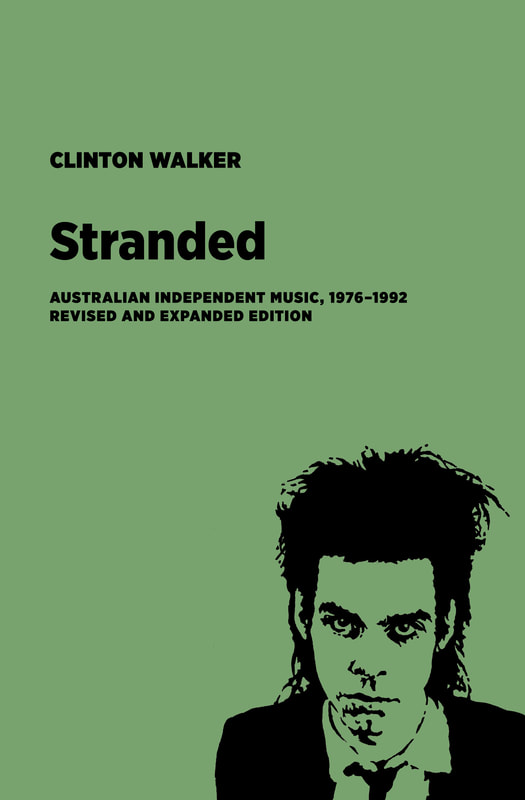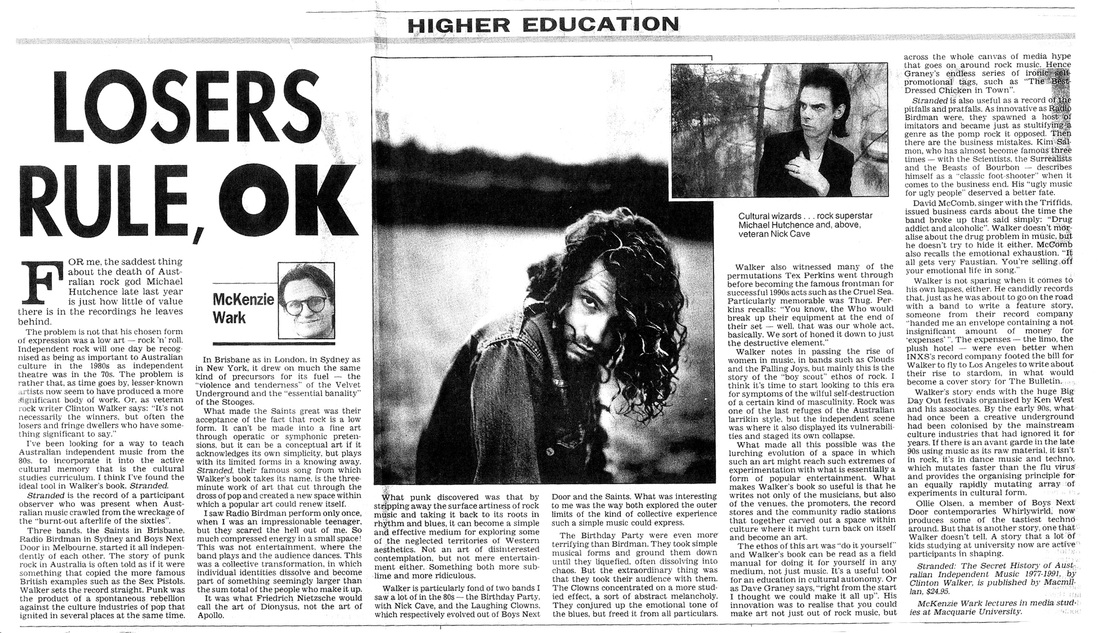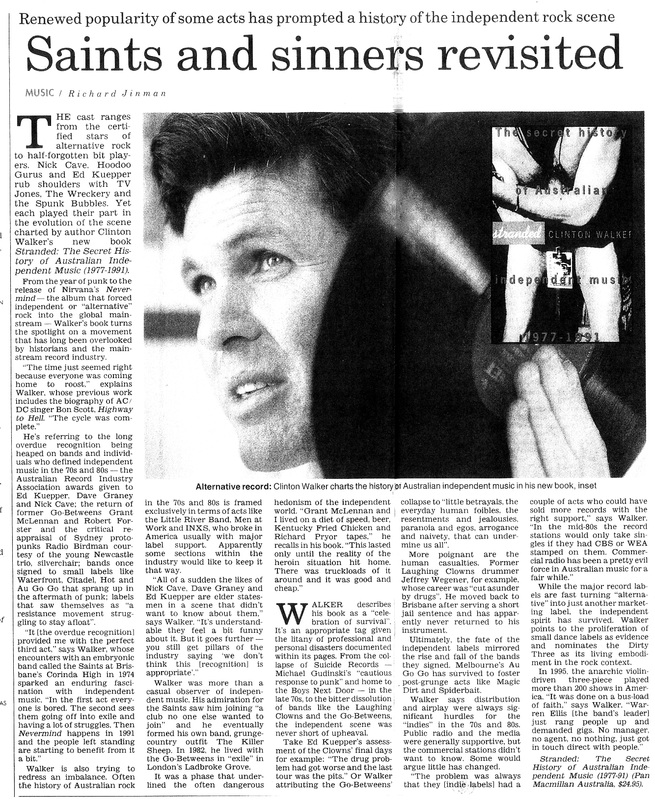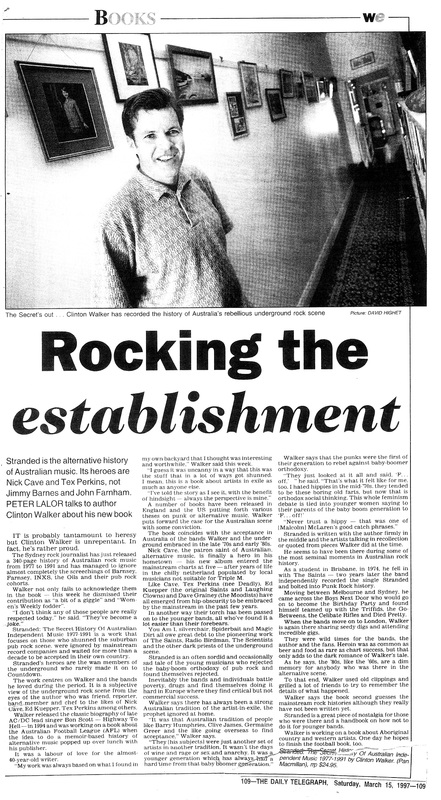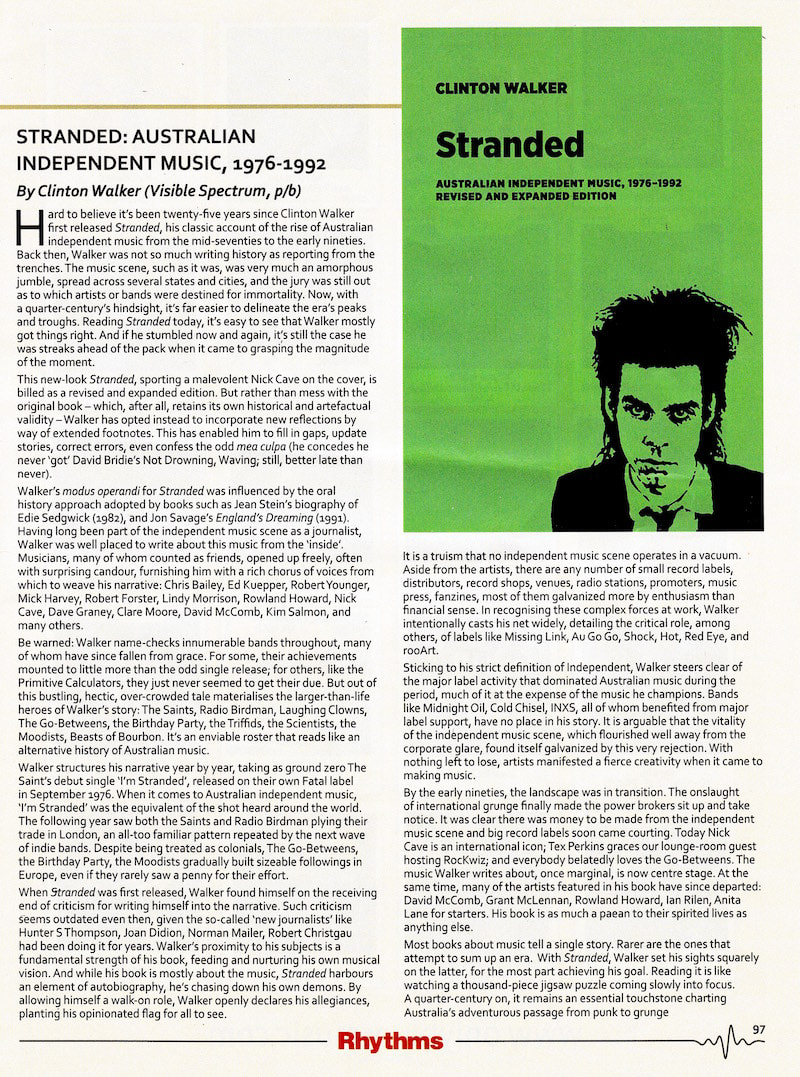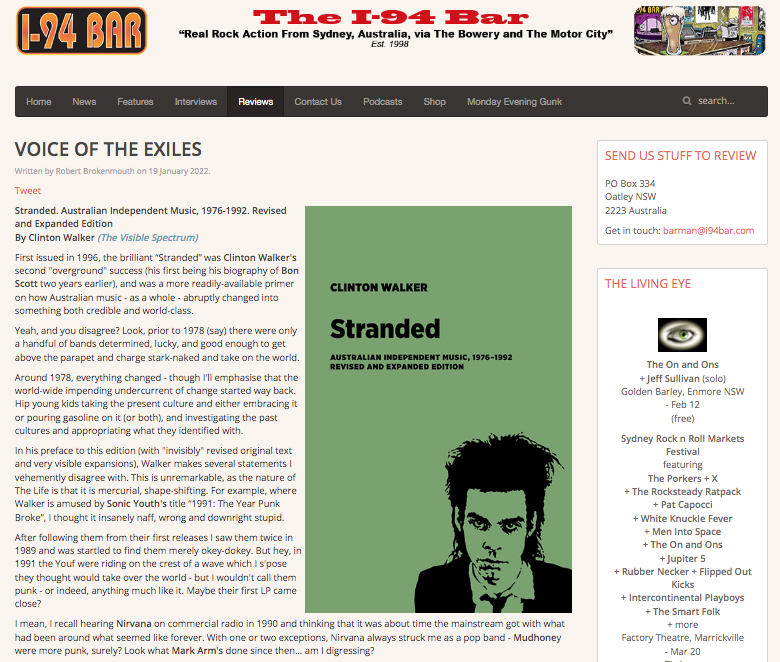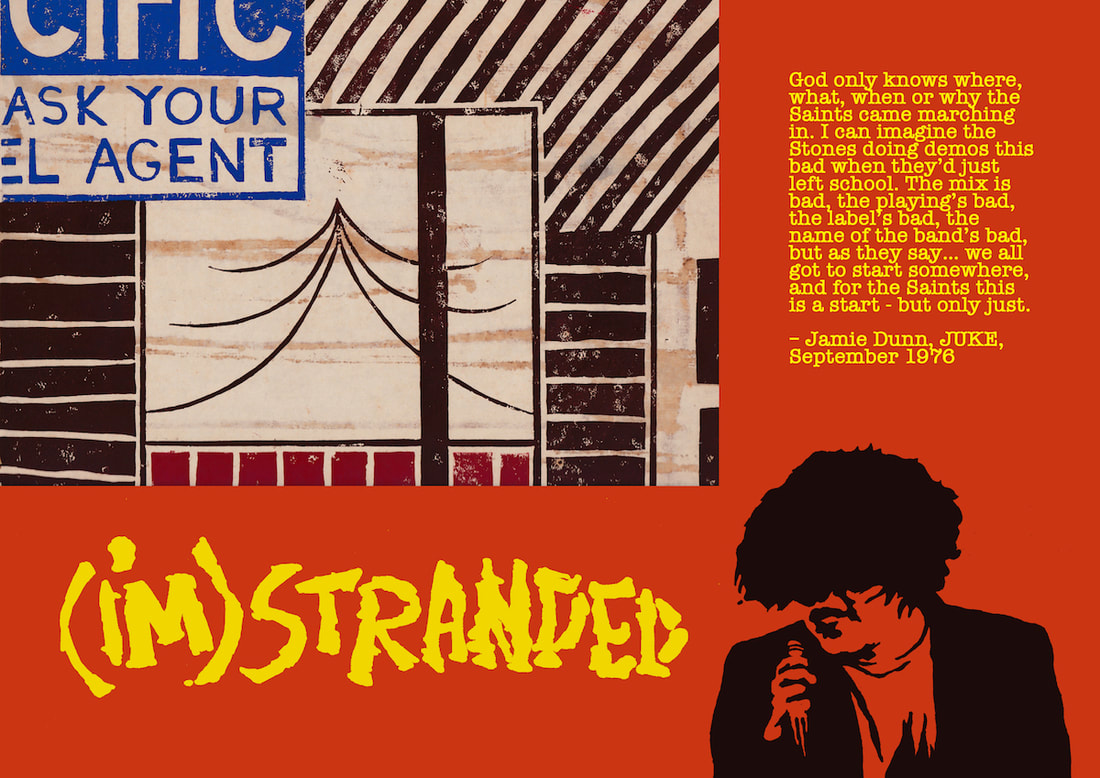STRANDED /(EXPANDED) (1996/2021)
|
“It was a dodgy job, but somebody had to do it. That is, open up a can of worms by trying to write a history of Australian independent music” - John Encarnacao, DRUM (1996) "Reading Stranded today with a quarter-century’s hindsight, it’s easy to see that Walker mostly got things right. And if he stumbled now and again, it’s still the case he was streaks ahead of the pack when it came to grasping the magnitude of the moment" - Des Cowley, RHYTHMS (2021) Stranded was first published by Pan Macmillan in Australia in 1996; now, in 2021, it is reissued, by the Visible Spectrum, in an expanded new edition, which you can BUY, if especially a hard copy, at Amazon here if you're outside Australia and Booktopia if you choose within in Australia; if it's an e-book you're after, go here for a links to all the online retailers. You can now also find chapter-by-chapter playlists to accompany the book on YouTube and Spotify. On Spotify just search for 'Stranded' on my user page called GoldenTone, or search for 'Stranded' in the playlists section. As a personal history of Australian independent music from punk to grunge, a sort of long-form narrative sequel to Inner City Sound, Stranded was generally well-received back in its day (as the number of glowing spruiks here attest), and it sold quite nicely too. But if this wasn’t without a degree of contention, since the book dared to fly in the face of the party line that said there is nothing in Australia beyond mainstream pub rock and its attendant ‘American Invasion’ – in other words, the corporate/stadium rock of Barnsey & Farnsey and INXS and Men At Work – the fact that Stranded has ultimately proved so prescient that its alternative reading of history has by now been so seamlessly integrated into the general orthodox history that it’s as if the culture wars it charts never even happened, is surely all the more reason to revisit it… Or, given that interest in it as a sort of Australian equivalent of England’s Dreaming or Please Kill Me has never really abated since it slipped out of print in the early 2000s, and given that the post-punk revision of rock history generally has only expanded ever since, it’s timely that Stranded (Expanded) now rejoins a pantheon of pioneers in that process. I can’t deny, even as the whole idea of equivalence I find a bit odious, that that was part of the Stranded project all along, just as it always was with Inner City Sound too: not even so much to worry about overcoming small-minded prejudice and impediments in our home country as putting this important Australian story on a par with parallel such stories overseas. The book has indeed been expanded, but in a very particular kind of non-revisionist way. This was a policy that the Visible Spectrum’s Steve Connell and I decided on from the very first: That we would not tamper with the original ‘integrity’ of the book; that errors of fact in the text would, of course, be corrected, but that beyond that, what I now saw as errors of judgment, or as omissions or excesses, would be noted in clearly delineated footnotes. And so the book is presented as it was but with the running-on adjunct of a series of footnotes, some long, some short, but all of them, as I like to joke, that tell the truth at last! In a way, it’s like an extended 12” remix of the original, or rather a box-set containing a trove of extra tracks. One of the very gratifying things for me about the book coming out again now 25 years after its original publication is that it perhaps finally puts paid to a lot of petty carping that has long dogged it. The two main gripes always were that a) the author himself is present as ‘I’ in the narrative, and b) the author’s choices, in terms of the emphases the book places. Well, umm, a) like you’ve never heard of the new journalism, and, umm, like, the author wasn’t a player in this story? This criticism, as Des Cowley put it in Rhythms, was “outdated even [in 1996], given the so-called ‘new journalists’ like Hunter S. Thompson, Joan Didion, Norman Mailer and Robert Christgau had been doing it for years. Having long been a part of the independent music scene as a journalist, Walker was well-placed to write about this music from the inside…[his] proximity to his subjects is a fundamental strength of his book.” As for my choices and emphases, I think for most people who didn’t like them it was because they were my choices and not theirs. And besides, I will still argue, the prescience of those emphases have been borne out… I suppose it’s testament to the quality of those artists themselves and their music – the stars of Stranded, that is, like Nick Cave, Ed Kuepper, the Go-Betweens, the Triffids, Dave Graney, the Scientists/Beasts of Bourbon, and others – that they survived at all, to firstly completely change the perception of Australian music overseas, or at least in Europe, and then to even enjoy a homecoming in which they were belatedly accepted as just as and perhaps even more significant than INXS or the Angels. It’s further testament that they certainly didn’t need me and my constant proselytising to do that. But I think it’s only fitting that their struggles are acknowledged and understood, and their achievements celebrated, both here in Australia and all round the world. Stranded (Expanded) is the story of a couple of generations of music and musicians who were ahead of their time but refused to be contained, and eventually, for their trouble – and there was more trouble than most rock bands not from far-flung Australia encounter – got their due. But I’ll not go on throwing up any more spoilers here now. If you want to know more, BUY the book! PS: But that Wikipedia entry on the book!? here, wow, naturally I had nothing to do with it and... - well, all I can say is, wow! Approach with caution. “Clinton Walker comes out swingin’ ... Desert island discs from a desert island rock scene. When no-one else is doin’ what he thinks is right he marches on stage, grabs some sort of fuckin’ guitar and does it himself” - Dave Graney |
|
“Traces Australian music’s transition from a provincial cargo cult to world power. The appeal of the book lies in seeing Walker juggle narrative and economic history, biography and autobiography, interview and prose ... mercifully free of the backstage hijinks, purple prose and PR puffery that plague rock journalism”
- Chris McAuliffe, SUNDAY AGE “Part memoir, part scrapbook, part history, part gossip, all linked by Walker’s passionate, sardonic commentary. He makes a strong case for the significance of embattled, innovative, underrated Australian bands whose impact is only now being understood and appreciated” - Philippa Hawker, MARIE CLAIRE “Stranded is more of ‘a’ history than ‘the’ history. But who’s complaining when the vision of this rock journo makes such a rollicking read?” - Andrew Block, AUSTRALIAN BOOK REVIEW "When Stranded was first released, Walker found himself on the receiving end of criticism for writing himself into the narrative. Such criticism seems outdated even then, given that so-called ‘new journalists’ like Hunter S. Thompson, Joan Didion and Norman Mailer had been doing it for years. Walker’s proximity to his subjects is a fundamental strength of his book" - Des Cowley, RHYTHMS “At least every few pages readers might come across a juicy snippet, whether fact or opinion, and maybe think, Hey, you can’t say that!” - Kerrie Hickin, RHYTHMS “It is with personal detail that Walker captures the tragedy of wasted talent, but more often the incredible rush that accompanies original artistic work” - Catriona Jackson, CANBERRA TIMES "Maybe rock critics should declare a conflict of interest when sharing accommodation and drugs with the musicians they’re writing about. Clinton Walker was both a rock critic and a groover round town, a little bit of a rock star himself. I think he fancied himself as Australia’s Lester Bangs" – Greg Appel "A superb book. Essential history. Clinton Walker (is) the great oral-historian/sociologist of Australian contemporary music, preserving so much of what so few bothered to take care of" – Mark Mordue "Shines an heroic light on these misfits that glows ever more brightly" – Michael Dwyer, AGE “I could not put Stranded down: it helps fit the pieces of the historical puzzle together and answers many of those ‘Whatever happened to?’ questions” - Chris Thomas, SUNDAY TIMES “A great piece of nostalgia for those who were there and a handbook on how not to do it for younger bands” - Peter Lalor, DAILY TELEGRAPH “A self-indulgent wankfest” - Paul Stewart, HERALD-SUN "Most books on music tell a single story. Rarer are the ones that attempt to sum up an era. With Stranded, Clinton Walker sets his sights squarely on the latter, for the most part achieving his goal. Reading it is like watching a thousand-piece jigsaw puzzle coming slowly into focus. A quarter-century on, it remains an essential touchstone" - Des Cowley, RHYTHMS |

